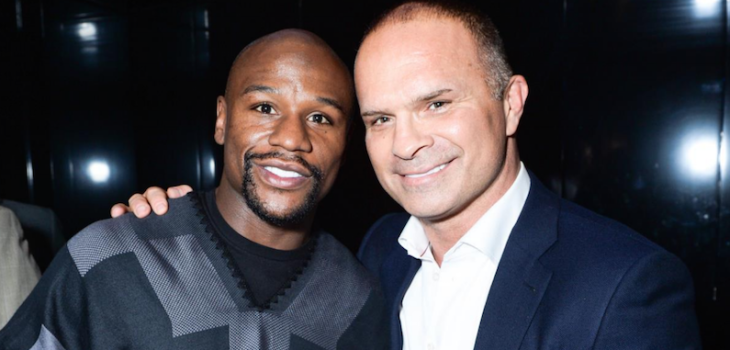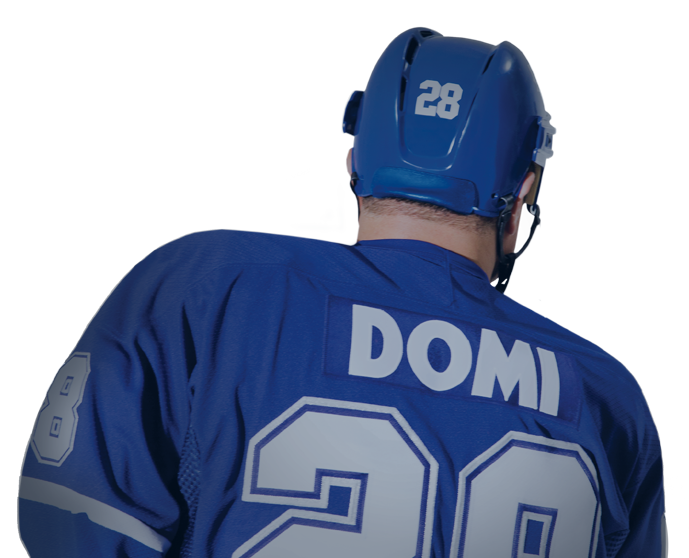
Tie Domi focuses on positivity, touches on fighting in ‘Shift Work’ autobiography
By NEIL BEST neil.best@newsday.com November 6, 2015
Some of Tie Domi’s best friends gathered Thursday at the Four Seasons hotel in Manhattan to celebrate the publication of his autobiography, “Shift Work.”
There he was, hugging Alex Rodriguez and Mario Lemieux, for starters. But when it came time for introductions during the formal portion of his launch party, Domi instead brought up some of the people he writes about in the book.
They included a waiter and bellman from the hotel, and a shoe shine man from the nearby Waldorf Astoria, and a TSA agent, all of them people he has befriended and lauded for their positive attitudes and hard work.
Not quite what one might expect from a book by one of the NHL’s most notorious fighters – a record 333 such encounters – and a subject most publishers had rejected since he retired in 2006.
But this is the book Domi, 46, insisted on writing, and now he has.
“My book is about treating people how you want to be treated, old-school values, dedicated to my father,” he said in an interview before the launch party. “I didn’t want to talk about what my job was, and that’s protecting my teammates.
“Everybody wanted to do a book about fighting and how did I do it when I’m so small. And I did go through tough times [after retirement] and I could have done a book back then. But it’s not about me going through tough times. It’s about my whole life experience and about trying give some life values to people. That was the goal.”
It took him 3 1/2 years to complete the project, he said, changing the approach “14 times until it was the way I wanted it and at the end of the day I did the book my way.”
Not that his fighting exploits are ignored, including during his relatively brief but memorable stay with the Rangers from 1990 to 1993. He knew he had to give readers some of that, including a detailed description of his tangles with famed enforcer Bob Probert.
Probert struggled with alcohol and drug abuse and died at 45 in 2010, one of a number of former NHL fighters who have had problems, physical and otherwise, after retiring.
But Domi hesitates to discuss such matters, in the book or in person, as part of his determination to be positive and forward-looking. He does mention his messy divorce and the impact of the 2008 financial crisis on him, but does not go into great detail. (He did say in the interview that ’08 was “the hardest punch I took.”)
When pressed, though, he acknowledged the toll all those fights had on one body part in particular.
“It’s all positive, no rear view mirrors,” the 5-10 Domi said. “I feel great. It’s just my hands, just my hands. When you understand the mentality of what I did, the size I am and the 333 fights, that’s just NHL. That’s not Junior C when I’m 14, Junior B when I’m 15, 350 penalty minutes in three years Junior A, the minors, preseason, playoffs or the street. There’s over 500 there.
“There are not many people on this planet that have fought that much. But I really don’t want to talk about it. My hands and my brain, who knows what’s going on? I don’t think about that kind of thing. But my hands, this [damp] weather now, I do feel that right away. That’s the only thing.”
Then he pointed to his head and said, “This coconut, who knows what’s going on?”
Domi is not particularly introspective or philosophical in the book about his fighting, the last gasp of an era that now is fading into NHL history. His approach is relentlessly pragmatic.
“That was my job, taking care of my teammates and protecting my teammates,” he said. “It’s a record that won’t be broken. And it’s a conversation piece. But I don’t want to talk about it. I said [to the publisher] I’ll give you headlines on my childhood, my career, and I’ll talk about the Probert fights because everybody wants to hear about the mental toughness side of it . . . But there are so many more values and experiences that I wanted to help people with in this generation.”
Domi said he works as a consultant and “strategic adviser.” (Rodriguez said he has known Domi for many years and met him through mutual business contacts.)
He splits his time between Toronto, where he played for the Maple Leafs from 1994 to 2006, and New York, where his girlfriend is based. He also travels to watch his son, Max, who plays for the Arizona Coyotes. Domi plans to attend Max’s game against the Islanders in Brooklyn on Nov. 16.
Domi called his time in New York “probably the three best years. Everyone says if you can last a year in New York you can last forever.”
The fact he is far less known in New York than Toronto allows him to meet and interact with strangers in a less complicated way, because they usually have no idea who he is. He said he is recognized in New York once every three days. “In Canada, literally every step, because of this melon,” he said, referring to his larger-than-average head.
Domi said he was pleased to see the Rangers contend for a Stanley Cup in recent years, and also enthused by the Islanders’ recent success.
“It’s going to be nice seeing that Rangers-Islanders rivalry again,” he said. “[John] Tavares is the real deal. He’s really figured it out. It’s pretty cool. He’s a great kid. I love him. He’s always been good to Max. He’s been a big role model for Max. So it’s really nice to see him doing well.”
Still, he said, having the Islanders in Brooklyn will take some getting used to.
“It is strange, yeah, it is, I have to admit,” he said. “If I think of Brooklyn, I think of the Brooklyn Dodgers.”
